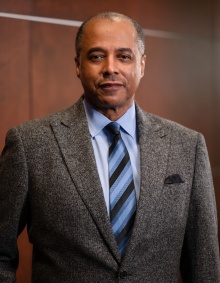Dean’s Column

It’s an honor to be writing to you — and serving as dean — during the School of Social Work’s 90th anniversary. For 90 years, the school has been advancing the dignity and worth of humankind and making a positive difference in our professional practice and research endeavors. Likewise, we remain steadfast in our commitment to trauma-informed care and respect for human rights. Diversity, equity, inclusion and accessibility are cornerstones of our school.
One way we have been able to thrive for nearly a century is by continually updating our programs and cocurricular opportunities in response to student needs and trends. Today, one of our many points of pride is our new virtual Paths to Macro Social Work Alumni Series, created to deepen our students’ understanding of macro practice and related career prospects.
Organized by Clinical Associate Professor Michael Lynch, MSW ’10, the series engages alumni nationwide in sharing their career stories steeped in social work traditions via macro practice. Danial Khan, MBA/MSW ’21, kicked off the series last year by discussing financial social work. Later, Jack Kavanaugh, MSW ’15, Kate Mini Hilliman, MSW ’17, and Jennifer Dunning, MSW ’09, described their work in nonprofits, public health and politics, respectively. You can catch up on many of these talks on our YouTube channel.
The title of the wonderful talk by Aimee Neri, MSW ’06, is particularly relevant: “Child Welfare Systems: Micro Skills for Macro Change.” She emphasized the transferrable nature of such foundational skills as active listening, reflective listening, the validation of feelings, effective use of silence and facilitative confrontation. Often, these skills are associated with micro practice, but clearly we should elevate these skills to bring about proactive change on a macro level.
Relationship-building is one of our best attributes, and macro practice certainly exemplifies connectivity. We simply partner with others on a larger scale. Likewise, when we work directly with individuals and families, we must put the macro in micro practice by advocating for their needs and working to improve the systems, communities and organizations they touch.
In this issue, you’ll find more examples of individuals using micro skills to make a profound impact, including two alumni who are making a difference at Goodwill of Western New York. Elsewhere, Adriana Ragland, MSW ’18 — another past presenter in our Paths to Macro Social Work Alumni Series — shares her inspirational story of founding the Neurodiversity Network of WNY. Finally, our cover story explains why transportation is a human right and how several faculty, students and alumni are making change on this issue.
In camaraderie and solidarity,
Keith A. Alford, PhD, ACSW
Dean and Professor